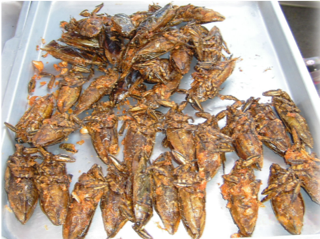
November 22, 2018, by Lexi Earl
Future Proteins: Is it all crickets?
This post is written by Prof Andy Salter and Dr Lexi Earl.
In October, a paper by Springmann and colleagues appeared in Nature setting out a rather bleak picture of the impact of future food production on the planet (https://doi.org/10.1038/s41586-018-0594-0). They concluded that by 2050, without mitigation, expected changes in population and income levels would lead to environmental effects that would be ‘beyond the planetary boundaries that define a safe operating space for humanity’ (p.519). This was based on the prediction that with greater economic stability the growing population would adopt diets richer in animal- derived food products. Such a shift has already be seen in many parts of the world, perhaps most notably in China over the last two decades.
This week the mood appears a little bit more optimistic with alternative protein sources hitting the news. The decision by Sainsbury’s to start selling Roasted BBQ Crickets seems to have particularly caught the imagination of the media. Insects are seen as a potential source of high quality protein that have a considerably smaller carbon footprint than conventional livestock. While a 12g bag (retailing at £1.50) of about 50 crickets may be some way from solving our global food security problems, it is interesting how this has caught the imagination of the press and perhaps demonstrates a willingness, of at least some of the population, to try alternative, environmentally friendly foods. Perhaps more significantly, it was also reported in the press this weekend that Beyond Meat, a start -up company, supported by the likes of Bill Gates and Leonardo DiCaprio, was in the process of raising $100million to expand its activity in producing ‘meat-like’ vegetarian burgers using plant – derived proteins.
It therefore appears to be a perfect time for the Future Food Beacon to be launching its Future Protein Platform. The Platform, led by Professor Andy Salter is the result of a successful bid for £1million from the Beacon’s Innovation Challenge this summer. The funding will provide two postdoctoral researchers and a number of PhD students to investigate the potential of a range of novel protein sources. Such protein sources will help to tackle the problem of producing sufficient protein to satisfy the population without the predicted catastrophic effects on the climate.

Recognising that it is unlikely that the whole world will turn vegetarian overnight, The Future Protein Platform will investigate not only novel proteins for direct human consumption, but also alternative sources for feeding livestock. Animal protein represents the highest quality in terms of both its amino acid composition and digestibility, but the livestock industry utilizes vast amounts of human edible crops as feed (like soya, wheat, and maize). Replacing these human-edible crops with more sustainable protein sources such as under-utilized crops, insects, algae or even bacteria may significantly reduce the impact of animal agriculture on the environment. However, many of these protein sources come with problems associated with inappropriate amino acid composition, poor digestibility and associated anti-nutritional factors, which can affect the uptake of other vital nutrients.

The Future Protein Platform will combine expertise from across the University, from Plant and Animal Science to Food, Nutrition and Engineering to investigate how these novel protein sources may be manipulated to maximise their nutritional value for direct human consumption, farm animal production and aquaculture. A combination of such ‘Future Foods’ should be one way in which we can avoid crashing into our planetary boundaries!
The Future Food Platform will shortly be recruiting researchers and PhD studies so keep an eye on our web pages: nottingham.ac.uk/future-food
References:
Springmann, M., Clark, M., Mason-D’Croz, D. et al. (2018) Options for keeping the food system within environmental limits. Nature562, pp.519-525.
Previous Post
Anatomics in Pearl MilletNext Post
Meet the Beacon: Prof Murray LarkNo comments yet, fill out a comment to be the first

Leave a Reply